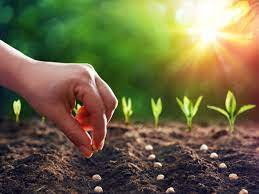In a period of expanding ecological cognizance, embracing economic practices in each part of our lives has become fundamental. Farming, being a huge supporter of our environmental impression, is a region where practical methodologies can have a significant effect. One pivotal part of reasonable cultivating is how we plant seeds. In this article, you will investigate different sustainable strategies, as per Benedict T palen Jr, for seed planting that advance natural equilibrium, preserve assets, and cultivate solid plant development.
Direct Seeding
Direct cultivating includes planting seeds
straightforwardly into the dirt and removing the requirement for seedlings.
This strategy diminishes the utilization of plastic plates, pots, and other
nursery supplies, consequently limiting waste age. By planting seeds, ranchers
can save water and energy expected for seedling creation and avoid relocation
shock. It advances grounded root improvement and empowers plants to adjust to
their indigenous habitat better.
Seed Broadcasting
Seed broadcasting, otherwise called seed dispersing or
ethereal cultivating, includes spreading seeds over a vast region the hard way
or utilizing the mechanical gear. This technique is great for crops with little
estimated seeds or is expected to be thickly planted. Seed broadcasting diminishes
work and hardware costs while considering productive seed appropriation. It
imitates normal seed dispersal components, advancing biodiversity and upgrading
environmental strength.
Precision Seed Drills
Accuracy seed drills are mechanical gadgets intended
to plant seeds with accuracy and precision. These machines guarantee uniform
seed separating, profundity, and inclusion, limiting seed squandering and
upgrading plant development. By exactly putting seeds at the right profundity,
seed drills improve germination rates and decrease rivalry between plants. They
likewise monitor assets by avoiding the abuse of seeds and composts, prompting
further developed crop yields and asset proficiency.
Seed Pelleting
Seed pelleting involves coating individual seeds with
a protective layer, usually made from biodegradable clay or compost. This
coating provides essential nutrients, protects against pests and diseases, and
improves seed handling and sowing. Pelleted seeds are easier to handle,
distribute, and sow, reducing seed loss and optimizing planting efficiency.
Furthermore, seed pelleting minimizes the need for synthetic pesticides and
herbicides, contributing to a healthier and more sustainable agricultural
system.
Integrated seed-fertilizer systems
Incorporated seed-compost frameworks consolidate seeds
with suitable manures, guaranteeing ideal supplement supply during germination
and early plant development stages. This approach limits the abundance of
manure application and decreases supplement overflow, which can defile water
bodies and mischief biological systems. By coordinating seeds and composts,
ranchers can better supplement take-up, further, develop crop efficiency, and
relieve ecological dangers related to supplement awkward nature.
The conclusion

No comments:
Post a Comment